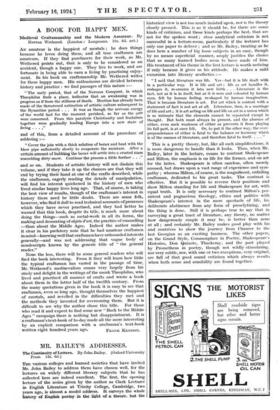MR. BAILEY'S ADDRESSES.
TKE various colleges and learned societies that have invited Mr. John Bailey to address them have chosen well, for the
lectures on widely different literary subjects that he has collected here are indeed excellent. The first, the opening
lecture of the series given by the author as Clark Lecturer in English Literature at Trinity College, Cambridge, two years ago, is almost a model address. It surveys the whole history of English poetry in the light of a theory. but the historical view is not too much insisted upon, nor is the theory closely pressed. This is as it should be, for there are some kinds of criticism, and those kinds perhaps the best, that are not for the spoken word ; close analytical criticism is not successful in a lecture-room, particularly if the lecturer has only one paper to deliver ; and so Mr. Bailey, treating as he does here a number of big loose subjects in an easy, though by no means superficial manner, amply justifies the choice that so many learned bodies seem to have made of him. His treatment of his theme in the first lecture is worth noticing if only because it gives us his attitude. He makes a mild excursion into literary aesthetics :— " I said that literature was life. Yes—but it is life dealt with in a particular way. It is life and art : life as art handles it, reshapes it, re-creates it into new birth. . . Literature is the fact, not as it is in itself, but as it is seen and coloured by human eyes, felt by human feeling, re-shaped by human imagination. That is because literature is art. For art which is content with a statement of fact is not art at all. Literature, then, is a marriage of life and art ; it is art acting on life and life on art in a union which is so intimate that the elements cannot be separated except in thought. But both must always be present, and the absence of either, even such weakness of either as prevents it from playing its full part, is at once felt, Or, to put it the other way, the over- preponderance of either is fatal to the balance or harmony which is of the essence of literature, and therefore fatal to itself. . . . "
This is a pretty theory, but, like all such simplifications, it is more dangerous to handle than it looks. Thus, when Mr. Bailey, later in the lecture, comes to contrast Shakespeare and Milton, the emphasis is on life for the former, and on art for the latter. Shakespeare is often careless, often merely amused, but draws upon a vast range of experience and sym- pathy; whereas Milton, of course, is the magnificent, unfailing craftsman, dedicated to his great tasks. The contrast is effective. But it is possible to reverse their positions and show Milton standing for life and Shakespeare for art, with equal truth. It is only necessary to contrast Milton's per- sistent and pugnacious theology, ethics and politics with Shakespeare's interest in the mere spectacle of life, his deliberate abstinence from any form of proselytizing, and the thing is done. Still it is perhaps true to say that in surveying -a great tract of literature, any theory, no matter how dangerously simple it may be, is better than none at all ; - and certainly Mr. Bailey makes good play with his and contrives to show the journey from Chaucer to the last Georgian as an exciting business. The other papers, on the Grand Style, Commonplace in Poetry, Shakespeare's Histories, Don Quixote, Thackeray, and the part played by Prometheus in poetry, though not wildly stimulating, nor very subtle, nor, with one or two exceptions, very original, are full of that good sound criticism which always results when both sense and sensibility are found together.










































 Previous page
Previous page